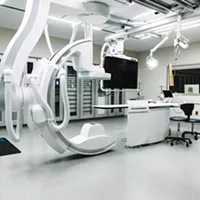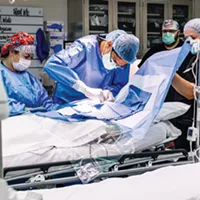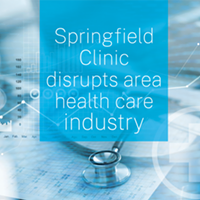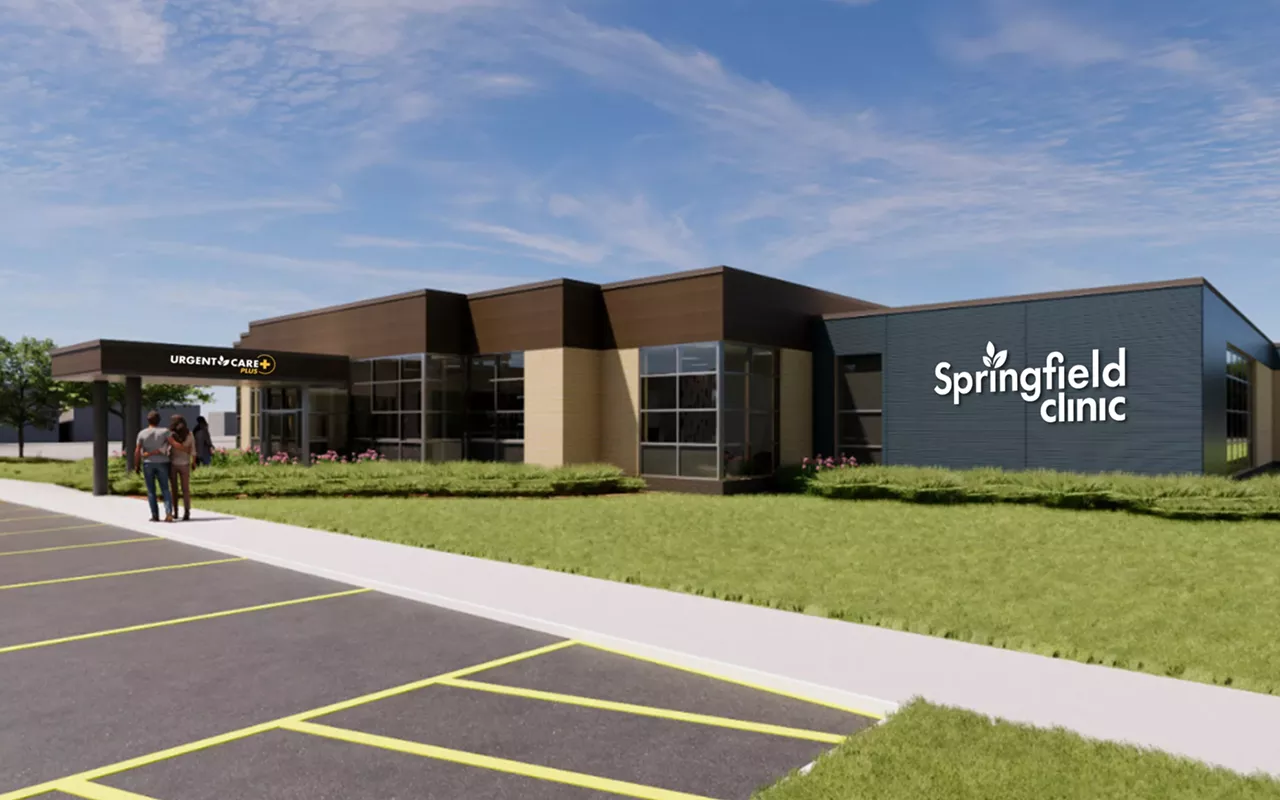Two recently opened rooms overlooking Springfield Clinic's main campus hold the promise of shorter waits for patients who need the blood vessels feeding their hearts examined or treated for potentially life-threatening blockages.
Two miles away, a new Urgent Care Plus, scheduled to open in January near Springfield's two acute-care hospitals, is designed to serve many of the patients currently seeking care in the hospitals' emergency rooms and avoid hours-long waits in those ERs.
The new services, costing a total of more than $16 million to establish, are described by clinic officials as a boon for patients. But they could siphon some revenue away from the city's two nonprofit hospitals as they struggle with the financial aftereffects of the COVID-19 pandemic and other forces stressing medical providers nationwide.
In the health care industry, for-profit Springfield Clinic, with more than $140 million in patient-care revenues, 350 doctors, 3,300 employees and a half-million patients in central Illinois, could be considered a market "disrupter."
However, officials from the 85-year-old, physician-owned multispecialty practice say they aren't trying to cause problems or financially harm other Springfield providers, with whom they collaborate.
"'Disruption to the norm' is a good way I would put it," Cal Thomas, the clinic's chief strategy officer, told Illinois Times in an interview.
"With our clinic model, it's very important that we maintain strong relationships with our local hospital partners. We're not part of these hospital systems legally or technically, but we are," he said.
Added Zach Kerker, the clinic's chief brand and advocacy manager: "Springfield has a long, storied history of being a great medical community, and we take the responsibility of carrying that on very seriously. But for us to carry the torch for this era, we can't continue doing things the way they've always been done. Health care is changing. How patients expect to receive health care is changing. The reality is, we all have to change with them."
Springfield Memorial Hospital and HSHS St. John's Hospital declined to comment directly on the clinic's Urgent Care Plus facility that is set to open sometime in January at 350 W. Carpenter St.
But the new outpatient cardiac catheterization service, which, unlike Urgent Care Plus, required state approval, was another story entirely. It became a reality only after more than a year of contentious debate about whether Springfield Memorial would be harmed by Springfield Clinic's new venture and whether the clinic was committed to serving the community's less fortunate.
The dispute over the $12 million project, housed on the third floor of a new $11 million, four-story building on the clinic's main campus on South Sixth Street, roiled the health care community and attracted comments from lawmakers and others locally and across the state.
Urgent Care Plus the first of its kind in central Illinois
Springfield Memorial Hospital, part of Springfield-based nonprofit Memorial Health, wouldn't say anything about the clinic's Urgent Care Plus to Illinois Times. The new facility will be only blocks away from the 500-bed hospital's ER.
Matt Fry, president and chief executive officer of 442-bed St. John's, which is a mile east of the one-story Urgent Care Plus site, issued a statement that didn't mention the new facility and said St. John's "provides state-of-the-art emergency care to any and all patients regardless of their medical condition."
The outpatient facility, in a building the clinic is spending more than $4 million to renovate, will be staffed by doctors who are specialists in emergency medicine, as well as nurse practitioners and physician assistants. It initially will be open from 7 a.m. to 7 p.m. seven days a week and holidays.
Urgent Care Plus, the first of its kind in central Illinois, will be geared for the 70% of patients who are treated for non-life-threatening conditions and discharged from hospital ERs. They aren't sick enough to need ambulances but have conditions that traditional urgent cares, prompt cares and express cares aren't designed for.
Springfield Clinic has hired Dr. DJ Goldberg and Dr. Janda Stevens to serve as co-medical directors of Urgent Care Plus. Goldberg, 44, and Stevens, 47, are veteran ER doctors who have been working in the St. John's emergency department.
Urgent Care Plus will help free up overburdened ERs in Springfield, making care smoother for patients who truly need an ER, according to Jen Boyer, a registered nurse who is the clinic's chief operating officer. She will become acting CEO when the current CEO, Ray Williams, retires Dec. 31.
New cardiac cath labs create waves

The clinic's two outpatient cardiac cath labs opened Oct. 1. They total about 9,400 square feet and are at one of only two freestanding cardiac cath sites in the state.
The new cardiac catheterization service allows Springfield Clinic doctors – cardiologists and vascular surgeons – to perform a variety of non-urgent procedures, most notably catherizations, or "caths."
Guided by low-level X-rays, doctors insert a flexible tube the width of a strand of spaghetti or thinner into an artery in a patient's groin. The catheter is threaded through vessels to reach the heart's chambers and vessels that supply the heart.
Once at its destination, the catheter can be used to diagnose various conditions. The catheter can be used to transport and deploy tiny metal devices known as stents to clear occluded arteries and prevent clogs from reforming.
Caths also can be used to intervene in active heart attacks, but patients in these emergency situations need to be treated in hospital settings and are not the type to be served in the clinic's new cath labs, Boyer said.
Cath procedures are part of a host of medical interventions, medicines and lifestyle changes that have contributed to significant decreases in heart-related death rates since the 1960s.
But Illinois, among the 35 states and Washington, D.C., that regulate large capital expenses in health care, requires organizations to obtain a "certificate of need" and provide justification for a new medical service such as cardiac catheterizations.
Hospitals often oppose competitors in these situations because heart-related procedures are highly profitable. Payments for the procedures help to subsidize money-losing services and care to patients on Medicaid, the publicly funded insurance program for low-income people that doesn't reimburse as highly as Medicare or private insurance.
The clinic eventually received approval for its cath labs in October 2023 in a 6-2 vote by the Illinois Health Facilities and Services Review Board. But that came after a majority on the board issued an "intent to deny" the project in December 2022.
What happened leading up the 2022 and 2023 votes were arguments about whether the new cath labs would lead to an unnecessary duplication of services and whether the clinic was serving enough low-income patients covered by the state- and federally-funded Medicaid program.
Springfield Memorial objected strenuously, while St. John's took a neutral position. Springfield Memorial houses five cath labs, and St. John's has 10.
Edgar Curtis, president and CEO of Memorial Health, a five-hospital system with Springfield Memorial as its flagship, told the state board in a July 2022 letter that the clinic's project would have a "significant negative impact" on Springfield Memorial's cath services.
"We anticipate SMH would lose over 2,600 outpatient cases, $20 million in net revenue and almost $70 million in operating margin annually," Curtis wrote.
"Additionally, with Springfield Clinic physicians already recruiting SMH staff trained in cardiac catheterization services, we anticipate losing vital staff during a time the whole health care industry is experiencing national staffing shortages."
Curtis said staffing shortages are leading to extra costs for traveling nurses and other staff to fill staffing gaps but are "contributing to unsustainable losses for most hospitals and health systems across the nation."
Indeed, Curtis told Illinois Times for a September 2023 story that such costs were a major reason Memorial Health had to lay off about 300 employees at that time.
Clinic officials said in documents filed with the state that it wasn't sure how Memorial calculated the financial impact and number of procedures it would lose.
The total number of procedures performed in the first year the two cath labs would be fully operational is 840, with the annual number potentially increasing to 2,000 in a few years, Boyer said. The impact of the cath labs on the hospitals would be minimal, she said.
The former CEO of Springfield Memorial, Charles Callahan, told the board in a September 2023 letter that the clinic's proposed project would come "at a time when over half of the hospitals in the nation are operating at a loss."
Callahan noted that Memorial Health – an organization with about $1.5 billion in annual revenues – lost $107 million in its 2022 fiscal year, with projections calling for an $81 million loss in the fiscal year that ended in September 2023. The loss ended up being $74 million, according to Memorial Health's audited financial statements.
Boyer said the clinic proposed its cath lab project because there hadn't been any additional cath labs opened in Springfield in the past 20 years. With the aging population needing more heart procedures, combined with staffing shortages at the hospitals related to the COVID-19 pandemic, clinic doctors saw wait times rising for their patients needing non-urgent cath procedures rising, she said.
Citing data from the state, the clinic noted that the number of patient cases handled by the existing 15 cath labs increased 58%, from 11,085 in 2004 to 19,180 in 2019.
The clinic said its non-emergency patients now see an average delay of 41 days from a positive stress test to a cath procedure in a hospital setting. That delay could be reduced to less than a week for many patients with the addition of the two cath labs, according to the clinic.
The delays lead to anxiety for patients and some patients leaving the community to get procedures quicker in St. Louis and elsewhere, Boyer said.
While national data suggest the risk of major heart-related complications during such waits is low overall – less than 2% – some complications may be preventable, clinic officials said.
Officials said outpatient cardiac cath procedures also save money for the Medicare system because the federally funded program pays lower rates for them outside the walls of a hospital. A majority of cath procedures are done on Medicare patients.
The debate over waits, Medicaid
Memorial took issue with
"The total area population is decreasing and is projected to continue to decline," Callahan said. "In addition, as medicine has advanced and more patients can be medically managed, less patients require catheterization."
In addition, he said the cath labs at Springfield Memorial have "unused availability," and patients can get a procedure within 24 hours, if needed.
Regarding the clinic's 41-day average wait for its patients, Callahan wrote: "The inability to schedule a patient sooner is not because of catheterization lab availability, but because of physician preference and lack of flexibility to adjust their own work schedules to accommodate the needs of their patients and community."
Theresa Eagleson, who at the time was director of the Illinois Department of Healthcare and Family Services, said in a 2022 letter to the state board that the clinic's project would "negatively impact the health equity of residents of central Illinois and lessen the viability of the two hospitals in Springfield that are currently providing these services to our Medicaid enrollees."
Eagleson wrote that the clinic's outpatient surgery center, handling non-cardiac cases since 1992, was serving virtually no patients covered by Medicaid, the state- and federally-funded program that serves low-income Illinoisans.
Eagleson said she worried that the trend would continue with the cath labs, which are an extension of the clinic's outpatient surgery center elsewhere on its main campus.
She said the new cath labs could lead many commercially insured patients to migrate from St. John's and Memorial, leading to financial pressure that could result in the hospitals reducing the number of Medicaid patients they serve.
That concern was reflected in letters of opposition to the project sent by several local, state and federal lawmakers, as well as Union Baptist Church, Black Lives Matter and The Springfield Project.
Opponents included state Sen. Doris Turner, D-Springfield, who wrote that the clinic's original application for state approval says patients covered by Medicaid represent only 5% of its total cardiology patients. Turner noted that the clinic provides no charity care while the hospitals do, and the hospitals also "take care of all patients regardless of their ability to pay."
Turner added: "Simply put, the increased patient access referenced in support for this project will not be gained by the Medicaid or the uninsured population. Instead, the for-profit entity will redirect commercially insured patients from hospitals well-equipped and most capable to safely provide this service – the same hospitals demonstrating stalwart support and service to their communities before, during, and after the COVID-19 pandemic."
Clinic officials said information in many of the opposition letters turned out to be false, and two state lawmakers, not including Turner, rescinded their opposition after meeting with clinic officials.
Clinic officials responded in documents filed with the board that said the 5% figure was misleading because it represented only cardiology patients who had received an outpatient cath procedure in the past three years.
In reality, Medicaid patients represent 10% to 12% of the clinic's cardiology patients, officials said. And in recent years, clinic officials said they took steps to increase the share of its Medicaid patients. The clinic in late 2022 obtained certification to be paid by Medicaid for patients at its outpatient surgery center.
The clinic said it grew its total percentage of all patients covered by Medicaid from 11% in 2020 to 15% in 2022. At Memorial, almost 22% of outpatients were on Medicaid in 2022; at St. John's, Medicaid covered almost 21% of outpatients that year.
Clinic officials said the share of its patients covered by Medicaid, based on 2022 data, exceeds the share at Cleveland Clinic (12%), Northwestern Memorial in Chicago (11%), Barnes-Jewish Hospital in St. Louis (10%) and Mayo Clinic (9%).
The clinic doesn't have an official charity care program but has a "patient discounts policy" that "outlines multiple ways patients are eligible for discounted care and is used in a physician-ownership setting such as the clinic's as a comparable solution to charity care policies at not-for-profit health care organization," clinic officials told the board.
The clinic says it offers more than 50 free medical outreach events to patients in disadvantaged communities each year and pays a total of $3.6 million to $4 million in property taxes in Springfield and other downstate communities. Nonprofit hospitals are tax-exempt.
Turner and several members of the Illinois Legislative Black Caucus wrote letters opposing the project. But state Rep. Justin Slaughter, D-Chicago, House chairperson of the caucus and officially neutral on the project, testified when it was approved in 2023. The Chicago Democrat encouraged the state board to evaluate the proposal responsibly.
"That responsibility," Slaughter said, "must transcend the politics that have reared their head."
It's inappropriate "to use the Medicaid population as a political football to influence decisions that will impact patients' access to care in Illinois," Slaughter said, "Especially when the Medicaid population is weaponized against a health care provider like Springfield Clinic who was making great effort to promote health equity and care for the Medicaid population."
Supporters included Ward 2 Ald. Shawn Gregory; Springfield Clinic doctors; Senate Majority Leader Kimberly Lightford, D-Maywood, who at first was opposed; the Illinois State Medical Society; state Sen. Sally Turner, R-Beason; and the Central Illinois Building and Construction Trades Council.
The view from HSHS St. John's Hospital
HSHS spokesperson Mary Massingale said the nonprofit system didn't take a stand because, "From our perspective, Springfield has ample existing capacity for cardiac cath lab services, including services HSHS St. John's Hospital provides. We trusted our clinical partners and the (state board) to make the decision on the need for additional services."
Springfield Clinic officials said seven doctors who are part of Prairie Cardiovascular, the physician group owned by HSHS, want to join the clinic and will do so in March 2025. They will join the clinic's eight cardiologists and five vascular surgeons in expanding downstate cardiovascular services.
Those doctors may help provide services at the two new cath labs once non-compete agreements with HSHS allow them to practice in Springfield, Thomas said. Most such agreements last about two years.
In the meantime, the seven will work at other Springfield Clinic locations in Illinois outside Springfield, Thomas said. The seven are cardiologists Ebert Caceres, Madhu Dukkipati, Jeffrey Goldstein, Gabor Matos, Nasaraiah Nallamothu and John Yang, and vascular medicine specialist Aman Khurana.
Massingale declined comment when asked HSHS' reaction to the impending departures. HSHS also declined an Illinois Times request to interview the doctors who are leaving.
She said in an email that Prairie has 102 providers on staff – 52 doctors and 50 advanced-practice providers – who care for patients in five regions across Illinois.
"Prairie Cardiovascular has the highest concentration of cardiology providers in the Midwest, and we continue to recruit nationally for experts in the field as part of our vision to provide outstanding heart care in Illinois," she said.
A patient's experience
Springfield resident Mark Anderson, 68, said he appreciated being able to undergo a cardiac cath procedure in one of the clinic's new labs a few weeks ago.
He said he had to wait only two weeks. That was shorter than he had to wait about four years ago, when a cath procedure at Springfield Memorial Hospital led to a stent being placed in one of his coronary arteries.
The more recent procedure didn't lead to a stent and came after he complained to his Springfield Clinic cardiologist, Dr. Sunil Agarwal, about feeling run down and occasionally short of breath. Anderson works as a securities special agent for the Illinois Secretary of State's Office.
Anderson said he likes having the option of a stand-alone outpatient cardiac cath facility.
"It was very impressive," he said.


